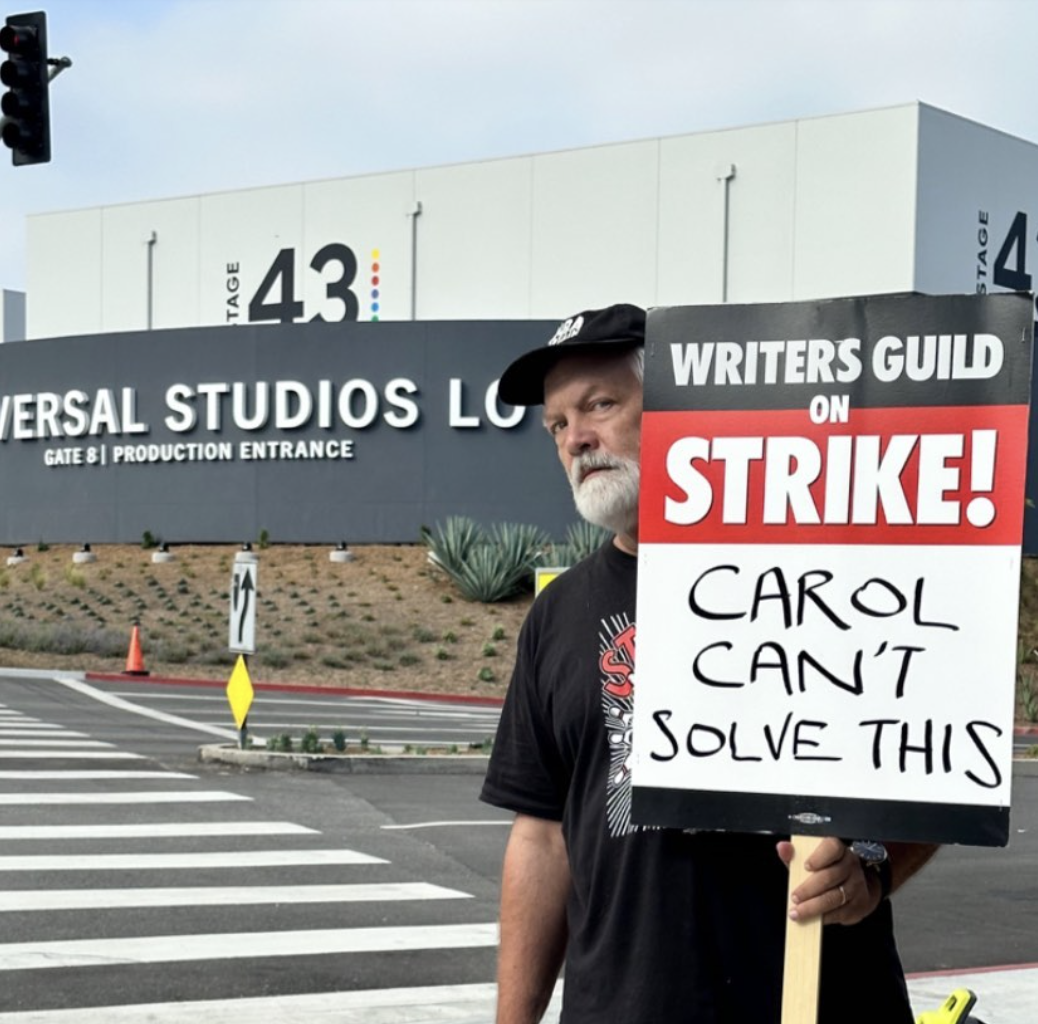Introducing another edition of Donor Spotlight, the blog series where we highlight donors to the Writers Guild Foundation and their reasons for giving. We’re only able to provide our programs and resources for the screenwriting community because of our donors’ generous support. Thank you to our spotlighted donors — and all of our donors — for your generosity!
Brian Nelson at the Universal Studios Barham picket line.
Last May, the WGA went on strike. Over the next five months, the Writers Guild Foundation staffed the Universal Studios Barham picket line and met so many dedicated and inspiring picketers there, including Brian Nelson, a long-time guild member and a strike captain at the Barham gate.
A few months after the strike ended, Brian made a generous donation to the Foundation during our year-end fundraising appeal. In his own words, Brian shares how the strike helped reconnect him with the Foundation and why our library is so important to keeping the history of screenwriting alive.
How did you decide to start picketing at Barham?
I had been picketing at Radford/Colfax from the beginning because A) I had some history there and B) it was, frankly, the closest to me too, but I remember hearing through the captains’ network very early on, “Oh, no one is at the Barham gate and we really need captains to help cover some of the shifts over there.” And the easiest way to get me involved in something is always to say, “Oh nobody’s doing it and we really need help.” It just always gets to me.
I had gone in the Barham gate for meetings many times, but I realized once I got there, “I bet a lot of people don’t even know this gate exists.” I remember the first time I entered through that gate I certainly was surprised. It’s so far away from Universal proper it feels almost like it must be Warner Brothers. It wasn’t, before the strike, very well-marked. Suddenly it became very important for them to put up a lot of signage once we were there!
Do you have any standout memories or takeaways from picketing with us at Barham?
So, first of all, I would tip my hat to you and your trivia questions that were there every time I showed up. I don’t know if you did them literally every day, probably you did, but they were certainly there on Wednesdays when I would show up. That was always fun because they hit the sweet spot of a trivia question: they weren’t too easy, nor were they rarely insanely hard either. You know, they always felt like something you could guess if you just clawed into your brain a little more deeply. So that’s what I think you want from a trivia question.
I remember there were special days like the day the cast and writing room of Superstore showed up, and the day that the picketers from Medieval Times showed up and walked with us. I also remember with a mix of amazement and cringe that there was one day where I was handed the bullhorn and asked to do a rap on it, and somehow I managed it and didn’t seem to embarrass myself too much. So that was a win.
Were you familiar with the Writers Guild Foundation prior to picketing with us? How so?
I had used the Library very often when I was starting out. Back when I was in the days where we wrote spec samples of existing shows—and there was barely not even this thing called “The Internet” yet—finding scripts of existing shows was tremendously hard. I would show up at the library—it wasn’t in its present location, it was at the other end of the building—and I’d spend, you know, like a whole day or however many hours I could get away with reading old scripts of shows like Homicide: Life on the Street.
Are there any Foundation programs or resources in particular that you’re inspired by?
I know that the Foundation does a lot in terms of mentoring and outreach to communities like veterans and people who are in need of writing help, and I really admire that.
I also really cannot say enough about the Library. To me, that’s what captures my heart. The notion that you can walk into a building and find all of this memorabilia and especially scripts from days when television was considered a disposable commodity. Those earliest days of the medium are, you know, so dear and fundamental, and the Foundation’s work in preserving our forebears’ efforts is everything.
I want to encourage anybody who has not come down there to visit the Library. I want to urge them to do that because it’s this inspiring treasure trove of not just great stories and writing but also our history. One thing that I was keenly aware of during the strike is how many people, sometimes even long-time members, did not actually know a lot about the Writers Guild‘s history when we began this action. The work of continuing to tell our story to ourselves is so important.
What motivated you to donate during our annual year-end appeal?
I had gotten some letters back in the day from the leaders of the Writers Guild Foundation who wrote very compelling appeals for donations, and there was a point in time where I made a number of donations and really enjoyed feeling like I was part of supporting such a vital endeavor. But, as happens sometimes with some charities, you know, I somehow had eased off on that.
When we were in the strike, and I met so many of the Foundation’s staff who were manning our table at Barham, I was just so touched at all of the time and heart and commitment that you all were putting into it. So, when it came to the end of the year, and December solicitations were coming in, that was the one I jumped on. I was like, “Oh my gosh, I should get back into the groove of donating to the Foundation,” because while I donate to a number of charities, this is something that actually has personally touched my life compared to how some causes I donate to are more remote from me. I love everyone at the Foundation and all of the work that is being done there, so I’m happy to have rediscovered the habit of getting behind that.
And, lastly, what script or scripts would you recommend someone read next time they visit the Library?
You know, one of my tests of “Is this a good film or television library?” is I ask, “Do you have some scripts or some material from East Side / West Side?” That’s a show that ran for one year in the early sixties starring George C. Scott as a social worker and it was, for its time, a rather phenomenal show, but nowadays it’s hard to find people who have even heard of it. So, I’m pleased to report that of course the Writers Guild Foundation Library has several scripts from East Side /West Side.
I’m not saying my test needs to be everyone’s test, but I do think everyone should ask themselves, “What would their test be?” Because, again, our investment in keeping the history of this art form alive is something that needs constant renewal.
If you’d like to join Brian and become a donor to the Writers Guild Foundation, click here!








